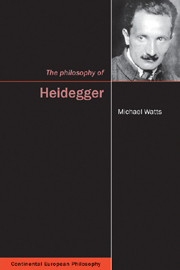Book contents
- Frontmatter
- Contents
- Preface
- Abbreviations
- 1 Heidegger's life
- 2 The meaning of life: the question of Being
- 3 The central ideas in Being and Time
- 4 Conscience, guilt and authenticity
- 5 Being-towards-death
- 6 Dasein's primordial temporality
- 7 The “truth of alētheia” and language
- 8 Heidegger on poetry, poets and Hölderlin
- 9 Heidegger on art
- 10 Heidegger on technology
- 11 Tao, Zen and Heidegger
- 12 Heidegger's politics
- Glossary
- Further reading
- Bibliography
- Index
2 - The meaning of life: the question of Being
- Frontmatter
- Contents
- Preface
- Abbreviations
- 1 Heidegger's life
- 2 The meaning of life: the question of Being
- 3 The central ideas in Being and Time
- 4 Conscience, guilt and authenticity
- 5 Being-towards-death
- 6 Dasein's primordial temporality
- 7 The “truth of alētheia” and language
- 8 Heidegger on poetry, poets and Hölderlin
- 9 Heidegger on art
- 10 Heidegger on technology
- 11 Tao, Zen and Heidegger
- 12 Heidegger's politics
- Glossary
- Further reading
- Bibliography
- Index
Summary
Heidegger initiated a radical “thinking” – distinct from conventional forms of “philosophizing” – that cast doubt on the validity of the fundamental basis of Western philosophy. His approach questioned the authority of long-accepted notions of logic and truth by focusing its interrogation not on the content of existence, but on the “primary condition” that enables existence. Thus the most important and persistent view of Heidegger is as a pioneering thinker concerned first and foremost with investigating the significance of the primary condition for all life, which he called “Being”:
Parmenides, in the early age of thinking, says, esti gar einai, “for there is Being”. The primal mystery for all thinking is concealed in this phrase … because thinking should be directed only toward saying Being in its truth … whether and how Being is must remain an open question for the careful attention of thinking. The esti gar einai of Parmenides is still unthought today … When philosophy attends to its essence it does not make forward strides at all. It remains where it is in order constantly to think the Same. Progression, that is, progression forward from this place, is a mistake that follows thinking as the shadow that thinking itself casts.
(“Letter on Humanism”, in BW: 238)The ontological “error” of Western philosophy
Philosophical speculation on the nature of Being is known as ontology. It began in fifth-century bce Greece, when Presocratic thinkers such as Anaximander, Heraclitus and Parmenides became intrigued by the seemingly inexplicable fact of existence and introduced a new way of thinking about the world and the place of human beings in it.
- Type
- Chapter
- Information
- The Philosophy of Heidegger , pp. 13 - 38Publisher: Acumen PublishingPrint publication year: 2011



